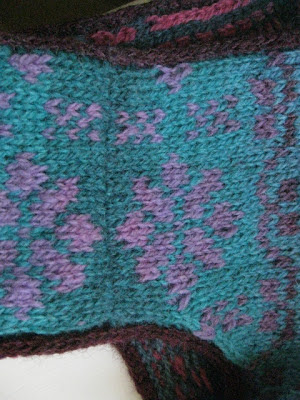In the bad old days before knitters wised up to ways to make their knits more seamless and organic, just about the only time you ever saw a reference to grafting (or, as I learned to call it, "Kitchener Stitch") was in patterns for socks. Then, I think largely due to the influence of Elizabeth Zimmermann, knitters woke up to the fact that grafting could be used in many more situations, and not just in stocking stitch. In fact, EZ recommended taking all the stitches off the needles to graft, a concept that still leaves many knitters gasping. She used it to join her famous
Moebius Scarf and in her popular
Ribwarmer.
When we first moved to Washington, DC and Isabel was an infant, I spent many hours nursing her while watching Schoolhouse Press videos and this was how I first became acquainted with the 3-needle bind off. I distinctly remember seeing Meg Swansen working it on a Norwegian sweater (the one from "Knitting in the Round"?) with Elizabeth looking on approvingly.
These days, both techniques are widely known and used.
So, with these two great choices for joining chunks of knitting, how do you make a choice? Here are the two questions I ask.
1. Are you working a pattern that would look best if the stitches coming from both directions met head-to-head? Remember that when two pieces are grafted together the stitches at the point of the join will meet one-half stitch off. This isn't a problem in garter stitch or stocking stitch, but if there's an aran pattern involved, everything will look better if 3-needle bind off is used to bring the pattern together without any offset. Example: this is the shoulder on my Wakefield jacket. See how the cable stitches meet each other head on?
The single line of stocking stitch at the far right that passes over the shoulder is the best argument for choosing 3-needle bind off over grafting for joining aran patterns.
2. Is the join at a point in the garment where stability and strength are a consideration? In fair isle knitting it is often possible to use grafting on the shoulders if you happen to be on a solid colour row/round. Even so, it may be better to choose a 3-needle bind off to give the shoulder seam more strength and to stabilize it.

Here, in my Trellis Waistcoat I opted for a 3-needle bind off for just that reason.
In my just completed Harriet jacket, again I chose 3-needle bind off over grafting to stabilize the centre back and minimize any sideways stretching. This is the back of my new jacket, currently laid out for blocking on the floor in our library.
If you look VERY closely you can see the join up the middle of the back. If it bothers you as a knitter, feel free to graft. I have no such qualms and prefer the speed of the bind off, especially when it's combined with the strength of the resulting seam.
Our cold spring seems to have turned into a cold summer. The furnace kicked on this morning for a while. This is the sort of weather that has cottagers lighting up their fireplaces. Ah, the scent of woodsmoke on a cool morning by the lake. (And thank goodness for wool!)
Our roses are finally beginning to come into bloom,
and the peonies are on the verge of explosion.
Yes, the entire front garden is white. Quite dramatic, thanks to the previous owner of our house.
As for Harriet, while the jacket dries, I'm contemplating button choices. You'll have to wait to see the result. For now, here's just a glimpse of everything coming together yesterday.
It's a bit blurry, but you can see all the garter stitch ridges coming together at different angles. Perhaps the most exciting moment in knitting this jacket!



















































